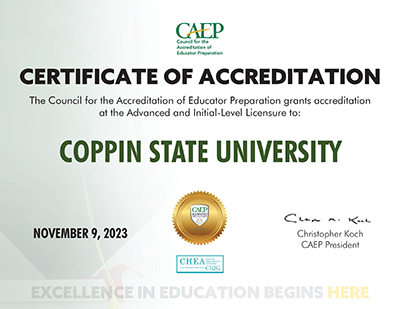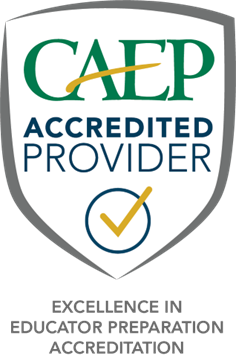EPP Accreditation
School of Education
EPP Accreditation

CAEP Accountability Measures
(Formerly known as CAEP Annual Reporting Measures)
CAEP has identified four (4) reporting measures that educator preparation providers (EPP) are required to track and document on an annual basis. CAEP Accountability Measures focus on two (2) areas: Impact Measures and Outcome Measures. Below is a summary of those measures.
| Impact Measures | Outcome Measures |
|---|---|
| Measure 1: Completer Effectiveness and Impact on P-12 learning and development | Measure 3: Candidate Competency and program completion |
| Measure 2: Satisfaction of employers and stakeholder involvement | Measure 4: Ability of completers to be hired in education positions for which they have been prepared |
Impact Measures
The data on completer effectiveness and impact on P-12 learning and development is aligned to CAEP Component R4.1.
The Employer Satisfaction Surveys as well as the Completer Satisfaction Surveys are administered through the University’s Office of Institutional Research for each completer and employer for up to three years following program completion to ensure consistency and triangulate data. This action will afford the EPP clear insights into the satisfaction of employers.
Outcome Measures
The EPP demonstrates that completers can effectively apply professional knowledge, skills, and dispositions through the collection of several key assessments. The EPP determines candidate competency at the completion of the program using the summative student teaching evaluation instrument and a cumulative electronic portfolio. In addition, a team of faculty and mentor teachers conduct exit interviews, which includes measures related to non-academic factors, specifically dispositions, to serve as another measure to triangulate data and assess candidates’ readiness to exit the program.
The EPP defines program completers as candidates who have met all program requirements, which include the state required Praxis II certification assessments. Praxis II reflects completers’ ability to meet state certification requirements and competencies at program completion. As a result, all candidates who are deemed a program completer have met all Praxis II requirements as reflected in the table below.
In addition to the ability of completers to meet state certification requirements, they must also meet EPP-created benchmarks. The measures designed by the EPP to assess candidate readiness for the field include:
- Student teaching evaluation
- Phase III electronic portfolio, with artifacts reflecting short- and long-term plans, impact on P-12 learning and development, and measures specific to the State of Maryland
- Candidate exit interview, which also assess dispositional measures
Candidates enrolled in the Administrative I Certificate program are required to meet capstone requirements, which include assessments on seven key assessments, which include an ePortfolio.
The data to document initial and advanced candidates’ competencies at completion are available at the link below.
The State of Maryland does not track employment of the state’s EPP completers. As a result, the institution monitors employment in the field in which the candidate is prepared through direct outreach to completers. Outreach to program completers reflects that at the initial program level all completers are employed in a position for which they were prepared. The employment data are available at the link below. following employment numbers in the field for which the completers were prepared.
Additional Accreditation Details
The Coppin State University’s Education Preparation Provider (EPP) is accredited by the Council for the Accreditation of Educator Preparation (CAEP). During CAEP’s most recent 2023 visit, they reviewed the following certification programs:
| program | Academic level | certification level |
|---|---|---|
| Elementary Education | Bachelor's | Initial |
| Elementary Education | Master's | Initial |
| Early Childhood Education | Bachelor's | Initial |
| Special Education | Bachelor's | Initial |
| School Administrator I | Certificate | Advanced |
Maryland State Department of Education (MSDE) Approval
In addition to accreditation, the programs offered by the EPP are also approved by the Maryland State Department of Education (MSDE). This approval extends to all degree and certificate programs that lead to educator preparation, including:


